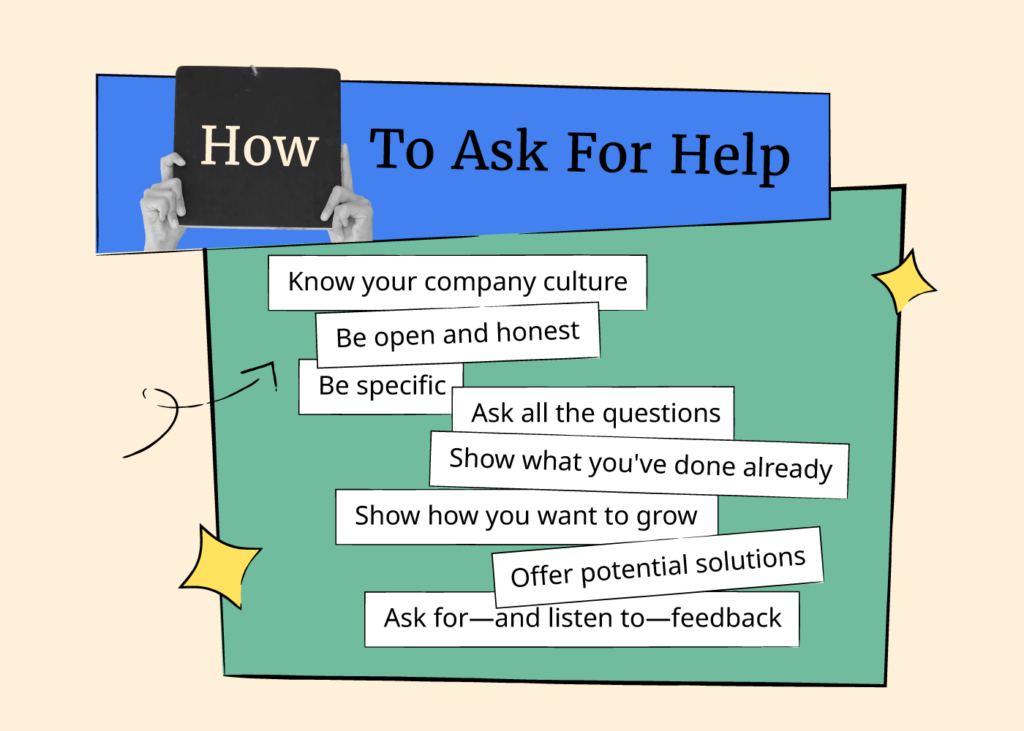"Don’t be afraid to ask questions. Don’t be afraid to ask for help when you need it. I do that every day. Asking for help isn’t a sign of weakness, it’s a sign of strength because it shows you have the courage to admit when you don’t know something, and that then allows you to learn something new." — Barack Obama
So you’ve been promoted to the managerial role you’ve been working towards for years. Congrats! You’ve achieved your ambitions, and you’ve been rewarded for your hard work.
But then you start in your new role, and quickly find yourself struggling. You knew that you’d have more responsibility and a heavier workload. Maybe you even relished the challenge. But, with demands coming in from all sides and new situations to navigate, you soon find yourself snowed under, taking work home with you, and wondering if you’ll ever be able to manage it all.
Perhaps your former peers are now your direct reports and you’re struggling to assert your authority while maintaining good working relationships. Or you’ve just come into a new team who’s morale has been hammered by their previous manager, so building trust is difficult.
You start to doubt yourself. Imposter syndrome sets in. You wonder if you’re really up to the job.
Stop. Breathe.
It’s perfectly normal for new managers to feel overwhelmed by their new responsibilities. That's why there are entire libraries of course content for new managers. The good news is that it’s okay to admit this and ask for help, as hard as that can be. But when and how you ask for that help matters.
Here, with the help of some experienced manager friends, l outline why it’s okay to ask for help as a new manager and how to approach it. I’ll cover:
- Why Are We afraid to ask for help?
- Why it’s more than okay to ask for help
- When you should consider asking for help
- How to ask for help
First up, let’s get over that fear.
Why Are We afraid to ask for help?
For many of us, a promotion reflects years of hard work and dedication and, naturally, we feel a well-deserved sense of pride in our achievements. So, when we’re suddenly confronted with a problem beyond our abilities, that pride can get in the way of asking for help.
But it isn’t just a question of ego.
Michelle Hague, HR Manager at Solar Panels Network USA, has seen managers struggling to ask for help for several reasons:
"First, you may feel like you need to prove yourself and show that you're capable of leading the team. Additionally, asking for help can make you feel vulnerable—like you're not sure if you're doing the right thing. Finally, there may be a fear of appearing weak or incompetent in front of your team."
Kane Carpenter, Practice Lead of Employer Branding & Growth Strategies at Daggerfinn, agrees, “New managers don't want to seem like they don't know what they’re doing and won't ask for help as a result.”
In fact, our reluctance to ask for help comes down to both our sense of pride and our lack of self confidence. If you’re feeling out of your depth, but you’re too proud or embarrassed to approach your boss for support, remember—you’re not alone.
Every manager I spoke to for this article agreed that they had found it hard to ask for help when they first started leading a team. A survey by Vantage Hill Partners found that the greatest fear among executives—up to and including CEOs—is being thought of as incompetent. A fear of appearing vulnerable was also high on the list.
So it’s not just new managers—and it’s certainly not just you.
Why it’s more than okay to ask for help

The quote from Barack Obama at the top of this article says it all really. If the president of the United States has to ask for help, then odds are you will too. But, if you need specific reasons, here are a few:
You’re new at this
As individual collaborators, we’re encouraged to strive for independence—but great managers know that collaboration and mutual support are just as important.
The fact is, you're not expected to know it all on day one. Great leaders never stop learning. You’re expected to ask for help.
“Many new managers have never managed before, and lack confidence in their requests and decisions,” says Jeremy Babener, founder of Structured Consulting. “You might fear that others will realize you're ‘not qualified’, even when you're just new to the position. But this is more of a psychological barrier.”
People want to help
Many of us underestimate how willing people are to help. Studies from Cornell University back this up. They found people are 48% more likely than expected to provide assistance to strangers when asked.
So, despite what you might think, your boss is far more likely to want to help you than to judge you for asking. In fact, a study in Management Science found that individuals actually tend to see asking for advice as a sign of competence.
Your boss expects it
If you’re worried about what your superior will think if you ask for support, just remember; they've been there themselves. Every manager, no matter how experienced, has at some point experienced being a new manager. They're perfectly placed to help you get to where they are.
Executive coach Keiko Toduka has been on both sides of the fence, as a new manager asking for help and an experienced manager being asked. Writing on Medium, she has some words of encouragement:
"As a manager, I never worry about the people who ask for more time, more resources, or more help from me. I trust that they will always speak up when they’re feeling stuck or in over their heads. Then we can work together on the best path forward."
In fact, Keiko says she’s more likely to worry about those who don’t ask for help when they need it.
Vulnerability is a learning opportunity
An analysis of middle and senior managers found that, instead of being seen as weaknesses, openness and vulnerability have a “generative capacity for alternative ways of managerial being and learning.” In other words, by asking for help, you create opportunities to learn and develop your managerial skills.
Of course, you will feel vulnerable when you realize you need to ask for help. But that’s not necessarily a bad thing. In fact, it may even be an opportunity. In our podcast, How To Own Your Emotion And Lead With Vulnerability, GrantMe CEO Jason Yee told us that vulnerability is an important leadership quality, as long as it’s tied to competence:
"I think it can create massive trust and buy-in and alignment... We’re all working together on our journey of self-development… I don’t think it’s possible for me to lead without being honest about where I need to improve as well."
When you should ask for help
If you feel overwhelmed or out of your depth, it’s definitely time to get support. For example, if you’re snowed under and taking work home, it’s time to start thinking about who you can ask for guidance on how to delegate.
“I think when you're right at the edge of your comfort zone,” says Kane Carpenter, “it's OK to try and figure something out yourself. When you feel like you are out of your depth completely, then it's time to ask for help.”
That’s the outer limit, though. You don’t need to reach the end of your tether first. Dan Trichter, co-founder of Accessibility Checker says, “If you're not sure, err on the side of asking for help. It's better to ask and not need it than to need it and not ask.”
That said, you don't want to be running for help at every challenge. You're a manager now, so it's vital that you've at least tried to have tried to resolve the issue yourself before looking for help.
Let’s say you’re in that situation where a former peer is now your direct report, but isn’t taking you seriously as a manager. If you go straight to your manager, it might look like you can’t handle your responsibilities. Better to go to your boss once you’ve had a one-to-one with the person, outlined what is expected, but haven’t seen an improvement.
Read this next if you want advice for running an effective one-to-one meeting.
“If you've been trying to figure something out for a while and you're not making any progress,” Michelle Hague says, “it may be time to ask someone else for their input."
Kathryn Boudreau agrees, “It’s time to ask for help if you have looked into every nook and corner to solve a problem, yet have not found the proper resolution.”
How to ask for help

There are a few things to keep in mind to ensure you're asking for help in the most effective way possible:
Know your company culture
"Some managers are always happy to help new managers, because the company values kindness and communication. On the other hand, other companies do not value hand-holding, and they expect all employees to be resourceful on their own to truly learn and grow. So, getting a sense of the company culture will help you decide how to best approach seeking help as a new manager." Miles Beckett, CEO and Co-Founder at Flossy
Action Point: If you’re new to the company, refer to your onboarding documents or what you know about the company culture to judge how requests for help will be seen. If you’re familiar with your own manager, you can also think about their personality and the way they tend to talk to you. Will they respond more positively to polite requests or assertive statements?
Example phrase: “I know that honesty is really important in this company, and I feel like I need to put my hands up and admit that, despite having a few meetings with both of them, I’m still struggling to manage the ongoing conflict between Dan and Christine. Do you have any suggestions?”
Be open and honest
"Most people enjoy being a mentor and helping others, especially when it comes to leveraging their own experience and expertise to guide and develop new managers. If, as a new manager, you're asking questions with the genuine desire to learn and get better, just ask!" — Kane Carpenter, Practice Lead, Employer Branding & Growth Strategies, Daggerfinn
Action Point: Make direct, factual statements without hedging or being apologetic.
Example phrase: “I’ve been trying to resolve this, but I’m still having difficulty with this point.”
Be specific
"Be specific about what you need help with and why you think your manager can help. For example, ‘I'm having trouble getting my team to work together on this project. I was wondering if you could give me some advice on how to get them to cooperate?’ This shows that you've thought about the problem and that you value your manager's opinion." — Dan Trichter, Co-Founder, Accessibility Checker
Action Point: Before going to ask for help, plan out the specifics of what you want to explain, what you are asking for help with, and why you’re coming to them in particular. It might help to write it down before your meeting.
Example phrase: “Since you’re more familiar with the team, perhaps you could give me an insight into this specific dynamic. I’m not sure what I’m seeing here.”
Ask all the questions
"Remember that you’re only a new manager once. Therefore, you can take advantage of this initial period by asking all the questions you need to ask. Your managers will appreciate your proactiveness and curiosity in learning how to do your job as well as you possibly can." — Nick Shackelford, Managing Partner at Structured Agency
Action point: Make a note of any gaps in your knowledge of your new position, and ask your manager questions that can fill those gaps.
Example phrase: “I noticed that you give extensive feedback after every client presentation. I’m wondering why you decided to do that and if you have any tips for how I could implement it with my team?”
Show what you've done already
"Always ensure that you have all the facts ready at hand, as well as the questions to ask. Share the steps you’ve taken to find solutions, and ask for their input in finding a better solution. Never be afraid to ask for help or share a new take on an existing problem." — Kathryn Boudreau, Remote Operations Manager, CallerSmart
Action point: Make sure you frame your request for help as a positive step, not as an act of desperation!
Example phrase: Instead of saying “I’ve tried everything and I’m out of ideas”, ask “Can you suggest another approach that might be more effective?”
Show how you want to grow
"In almost all cases I find that ‘positive curiosity’ carries the day. Don't hide when you don't know something, and show confidence that when you learn the information you'll be ready to apply your good judgment." — Jeremy Babener, Founder at Structured Consulting
Action point: Explain why you’re asking what you’re asking and how it will help you improve your own or your team’s performance in the future.
Example phrase: “Can you explain how to run this process, so that I have it ready for the next time?”
Offer potential solutions
"It can be helpful to come up with a few potential solutions before you ask for help. This shows that you've already been thinking about the problem and you're looking for guidance on which solution to pursue." — Michelle Hague, HR Manager at Solar Panels Network USA
Action point: Present your suggested solutions and ask for feedback. Be prepared to say if you disagree—but make sure you can give a good reason!
Example phrase: “I think that moving Samantha to the Sales team might be a more effective use of her skillset. But I’m aware that might create some pushback from the rest of the team. What do you think?”
Ask for—and listen to—feedback
"Be willing to listen to feedback and take it constructively. Asking for help is a sign of strength, not weakness. By being open to feedback, you're showing that you're committed to being the best manager possible." — Michelle Hague, HR Manager at Solar Panels Network USA
Action point: Turn feedback into learning points—and action points!
Example phrase: “I’d love to know what you think about the way I handled this recent situation. Do you think I need to be more assertive?”
Need help? Just ask!
Reaching the manager’s role is not the peak of your achievements—it’s a new beginning. So while you have achieved a milestone, and reached a higher status, you’re also a newbie again. That means you’ve got some learning to do.
Your new management peers and your line managers have all been in your shoes, and they know they’ve got wisdom to share.
So if you really need some help, just ask.

The New Manager Handbook
Hard-learned words of wisdom from seasoned people managers to those just starting out.
If you want to invest in developing your leadership skills and abilities, here are some further resources:
- People Management Tips For New And Experienced Managers
- How To Support New Managers With A People Partner Program
- 10 Best Leadership Development Programs to Grow Future Leaders in 2023
- Engaging Employees Through Empathetic Leadership: What I Learned
- From Friend To Boss: How To Establish Authority & Set Boundaries As A New Manager
- 14 Leadership Books For New Leaders To Read In 2023
- Unlearning Leadership: How To Lead In The New World Of Work (with Bev Attfield from Within People)
- 13 best leadership certificates to help you become a better leader
- In Too Deep: How To Keep Calm & Carry On When You’re Overwhelmed As A New Manager
- How To Handle Awkward And Uncomfortable Conversations: What Every New Manager Should Know
- Best Mentoring Software for Mentors and Mentees




